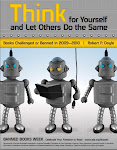Seattle Times editorial columnist
Annoying? Yes. A violation of my rights? No. It's not my computer.
The case decided last week, Bradburn v. North Central Regional Library District, is about computers in 28 libraries in Chelan, Douglas, Ferry, Grant and Okanogan counties. The computers are public. Patrons' taxes paid for them. Still they are the library's and are provided to advance the library's purposes.
If porn is all they blocked, probably no lawsuit would have happened. Who is brazen enough to demand the right to watch porn at the public library? But Sarah Bradburn of Republic wanted information on teen smoking. Pearl Cherrington of Twisp wanted to see the Web page of an art museum. Charles Heinlen of Okanogan wanted to see the Second Amendment Foundation's Web page, "Women and Guns." All three were blocked.
At the downtown Seattle Public Library, which has a section of filtered computers for kids, these folks could have sat in a section of unfiltered computers for adults. But in the North Central Regional Library District, when a page is blocked you have to ask for that page. Some official looks at the page and decides whether to let you see it.
Heinlen resented that. He felt he was treated like a kid. "To me it's an issue of trust," he says.
In the North Central Regional system, the decision to unblock is made in Wenatchee by Dan Howard, director of public services. Howard told me he would have unblocked the requests named here. He said he "would have worked all weekend" to unblock the art museum Web page. His library system's policy is to block porn, gambling, and a few other things. Not "Women and Guns."
The case at the Washington Supreme Court was not about whether North Central Regional's policy is good. It was about whether the library has a right to choose that policy. And the court said it does.
A public library can choose what to offer — just as PBS can choose what to put on the air, even though it is a public system. "A public library has no obligation to make available any and all constitutionally protected material," wrote Chief Justice Barbara Madsen.
Different libraries make different choices. The University of Washington does not filter Internet access for students or staff. Nor does Catholic-affiliated Seattle University. Seattle Pacific University, affiliated with the Free Methodists, filters for porn.
In King County libraries, computers are filtered lightly. The librarians can turn on heavy filtering for a child or turn it off completely for an adult. They don't want to be looking at individual Web pages and deciding yes or no. Says Bill Ptacek, director, "We worry about the conduct in libraries and not the content."
Technology is tending to make the whole issue moot. When the lawsuit was filed several years ago, the Okanogan complainant, Heinlen, didn't have a computer. Now he does. He is also a student at Wenatchee Valley College, Omak campus, and it has computers, too.
The librarian there says they are not filtered.
Bruce Ramsey's column appears regularly on editorial pages of The Times. His e-mail address is bramsey@seattletimes.com





No comments:
Post a Comment